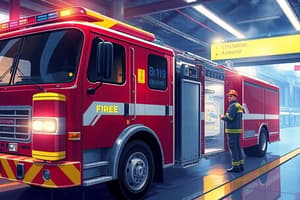Podcast
Questions and Answers
What is the purpose of the Chesapeake Fire Department's Respiratory Protection Program?
What is the purpose of the Chesapeake Fire Department's Respiratory Protection Program?
- To ensure the safety of the public during hazardous situations
- To protect members from exposure to hazardous atmospheres (correct)
- To reduce the amount of equipment needed for firefighting
- To increase the amount of training required for members
Who is responsible for overseeing the objectives of the Respiratory Protection Program?
Who is responsible for overseeing the objectives of the Respiratory Protection Program?
- Company officers
- Members using respiratory protection
- Respiratory Protection Manager (correct)
- Certified technicians
When must members use respiratory protection devices?
When must members use respiratory protection devices?
- When they are in a safe environment
- When they are exposed to harmful environments (correct)
- When they are performing administrative duties
- When they are off-duty
What is the purpose of fit tests?
What is the purpose of fit tests?
What is the purpose of a medical evaluation questionnaire?
What is the purpose of a medical evaluation questionnaire?
When should cartridge respirator filters be replaced?
When should cartridge respirator filters be replaced?
What is the purpose of annual flow testing?
What is the purpose of annual flow testing?
What should members do if they are exposed to a hazardous atmosphere?
What should members do if they are exposed to a hazardous atmosphere?
When should full-face respirators not be used?
When should full-face respirators not be used?
What should members do if they experience an injury or exposure to a hazardous substance?
What should members do if they experience an injury or exposure to a hazardous substance?
Flashcards are hidden until you start studying
Study Notes
- The Chesapeake Fire Department has a Respiratory Protection Program to ensure the safety of its members.
- The policy applies to all members whose job duties could require them to use respiratory protection due to exposure to hazardous atmospheres.
- The program manager oversees the objectives of the policy and ensures legal mandates are met.
- Members must use respiratory protection devices when exposed to harmful environments.
- Members must ensure they have no facial hair or other conditions that could interfere with the seal of the facepiece.
- Members shall not wear corrective glasses or other PPE that interferes with the seal of the facepiece.
- Company officers monitor members using respiratory protection and evaluate the continued effectiveness of the respirator.
- Self-contained breathing apparatus (SCBA) must be used when entering an atmosphere that may be immediately dangerous to life or health.
- Full-face respirators may be used in situations where the use of SCBA is not necessary or practical.
- The program includes guidelines for respirator use, inspection, cleaning, maintenance, and repair, as well as required training, testing, and evaluation.
- Full-face respirators should not be used in oxygen-deficient atmospheres.
- Air-purifying respirators (APR) only filter particulates and should not be used in IDLH atmospheres.
- Power air-purifying respirators (PAPR) use a blower to supply purified air to the face piece.
- Cartridge respirators are used in areas where gases, vapors, dusts, fumes, or mists are present.
- Cartridge respirators should not be used in oxygen-deficient atmospheres or a risk of exposure to the face or eyes.
- Cartridge respirator filters should be replaced when the wearer smells, tastes, or is irritated by a contaminant or has difficulty breathing.
- Members should complete mandatory training before using respirators.
- SCBA and respirators should meet NFPA and NIOSH standards.
- Fit tests should be done annually, or more frequently if there are changes in the respirator or physical changes in the user.
- Members using respiratory protection must complete a medical evaluation questionnaire annually.
- SCBA and respirators must be inspected and maintained regularly
- Inspections should check for issues with air supply, facepiece, head straps, inhalation/exhalation valves, and filter elements
- SCBA should be serviced annually by certified technicians
- Respirators should be cleaned and sanitized after each use
- Respirators in storage must be protected from damage and labeled properly
- Annual flow testing is required for all SCBA
- Members exposed to hazardous atmosphere should leave the area and seek medical attention if necessary
- Any injury or exposure must be documented on an injury reporting form
- Exposed members should not drive a vehicle
- The exposure agent should be identified if possible and a Safety Data Sheet obtained if available.
Studying That Suits You
Use AI to generate personalized quizzes and flashcards to suit your learning preferences.


